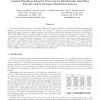Free Online Productivity Tools
i2Speak
i2Symbol
i2OCR
iTex2Img
iWeb2Print
iWeb2Shot
i2Type
iPdf2Split
iPdf2Merge
i2Bopomofo
i2Arabic
i2Style
i2Image
i2PDF
iLatex2Rtf
Sci2ools
130
click to vote
EUC
2007
Springer
2007
Springer
Assured-Timeliness Integrity Protocols for Distributable Real-Time Threads with in Dynamic Distributed Systems
Networked embedded systems present unique challenges for system designers composing distributed applications with dyanmic, real-time, and resilience requirements. We consider the problem of recovering from failures of distributable threads with assured timeliness in dynamic systems with overloads, and node and (permanent/transient) network failures. When a distributable thread encounters a failure that prevents its timely execution, the thread must be terminated. Thread termination involves detecting and aborting thread orphans, and delivering exceptions to the farthest, contiguous surviving thread segment for possible execution resumption. Thread termination operations must optimize system-wide timeliness. We present a scheduling algorithm called HUA and two thread integrity protocols called D-TPR and W-TPR. We show that they bound the orphan cleanup and recovery time with bounded loss of the best-effort property—i.e., high importance threads are always favored over low importance...
Applied Computing | Contiguous Surviving Thread | Distributable Thread | EUC 2007 | Thread Integrity Protocols |
Related Content
| Added | 07 Jun 2010 |
| Updated | 07 Jun 2010 |
| Type | Conference |
| Year | 2007 |
| Where | EUC |
| Authors | Binoy Ravindran, Edward Curley, Jonathan Stephen Anderson, E. Douglas Jensen |
Comments (0)

